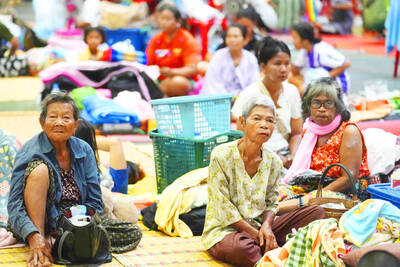South Korean troops are on guard against any military provocation by North Korea after the communist state ordered a border clampdown amid worsening ties, the defense ministry said yesterday.
The North on Monday imposed strict border controls and ordered the expulsion of hundreds of South Koreans working at the Kaesong joint industrial estate, in protest at what it calls the Seoul government’s confrontational policy.
It also halted a cross-border cargo rail service and a popular day tour.
“In response to the North’s Dec. 1 measure, surveillance and control operations are being stepped up against [any] naval attacks and attempts to kidnap fishing boats,” the ministry said.
Special training programs are also being implemented to cope with “contingencies” along the heavily fortified land border, it said in a report to parliament.
Some analysts believe the North may provoke a limited clash around the disputed border in the Yellow Sea, the scene of bloody naval battles in 1999 and 2002.
The ministry report also said the North deployed new ballistic missiles last year with a range of 2,500km to 4,000km. It was building up ground forces including tanks, artillery and special warfare troops.
A defense ministry spokesman declined to elaborate on the missiles.
The report also accused the North of breaching or failing to honor most military agreements reached between the two sides, who have remained technically at war since their 1950 to 1953 conflict ended only in an armistice.
Ties have worsened since a conservative government came to office in Seoul in February, after 10 years of liberal rule marked by a “sunshine” policy of engagement and generous aid to the North.
The new government linked major economic aid to progress in the North’s denuclearization, a stance that enraged Pyongyang.
North Korea is also angry at propaganda leaflets floated by activists across the border. The activists released 10 huge gas-filled balloons yesterday carrying a total of 100,000 leaflets, the second such launch in as many days.
“Down with the Kim Jong-il dictatorship!” read a slogan on one.
The unification ministry, which handles cross-border ties, appealed again for a halt to the launches “in consideration of the current inter-Korean situation.”
It says it has no legal power to ban them.
Also unhappy at the balloons are owners of Kaesong factories. The North ordered hundreds of South Koreans to leave the Seoul-funded estate and now permits only 880 of them to work there, half the number that Seoul says are needed.
Factory representatives urged the Seoul government to stop the balloon launches.
“Some leaflets fell on a factory roof and there was a misunderstanding [that] they were spread by South Korean staff there,” said one businessman quoted by Yonhap news agency.

FOREST SITE: A rescue helicopter spotted the burning fuselage of the plane in a forested area, with rescue personnel saying they saw no evidence of survivors A passenger plane carrying nearly 50 people crashed yesterday in a remote spot in Russia’s far eastern region of Amur, with no immediate signs of survivors, authorities said. The aircraft, a twin-propeller Antonov-24 operated by Angara Airlines, was headed to the town of Tynda from the city of Blagoveshchensk when it disappeared from radar at about 1pm. A rescue helicopter later spotted the burning fuselage of the plane on a forested mountain slope about 16km from Tynda. Videos published by Russian investigators showed what appeared to be columns of smoke billowing from the wreckage of the plane in a dense, forested area. Rescuers in

‘ARBITRARY’ CASE: Former DR Congo president Joseph Kabila has maintained his innocence and called the country’s courts an instrument of oppression Former Democratic Republic of the Congo (DR Congo) president Joseph Kabila went on trial in absentia on Friday on charges including treason over alleged support for Rwanda-backed militants, an AFP reporter at the court said. Kabila, who has lived outside the DR Congo for two years, stands accused at a military court of plotting to overthrow the government of Congolese President Felix Tshisekedi — a charge that could yield a death sentence. He also faces charges including homicide, torture and rape linked to the anti-government force M23, the charge sheet said. Other charges include “taking part in an insurrection movement,” “crime against the

POINTING FINGERS: The two countries have accused each other of firing first, with Bangkok accusing Phnom Penh of targeting civilian infrastructure, including a hospital Thai acting Prime Minister Phumtham Wechayachai yesterday warned that cross-border clashes with Cambodia that have uprooted more than 130,000 people “could develop into war,” as the countries traded deadly strikes for a second day. A long-running border dispute erupted into intense fighting with jets, artillery, tanks and ground troops on Thursday, and the UN Security Council was set to hold an emergency meeting on the crisis yesterday. A steady thump of artillery strikes could be heard from the Cambodian side of the border, where the province of Oddar Meanchey reported that one civilian — a 70-year-old man — had been killed and

Philippine President Ferdinand Marcos Jr is to meet US President Donald Trump this week, hoping Manila’s status as a key Asian ally would secure a more favorable trade deal before the deadline on Friday next week. Marcos would be the first Southeast Asian leader to meet Trump in his second term. Trump has already struck trade deals with two of Manila’s regional partners, Vietnam and Indonesia, driving tough bargains in trade talks even with close allies that Washington needs to keep onside in its strategic rivalry with China. “I expect our discussions to focus on security and defense, of course, but also